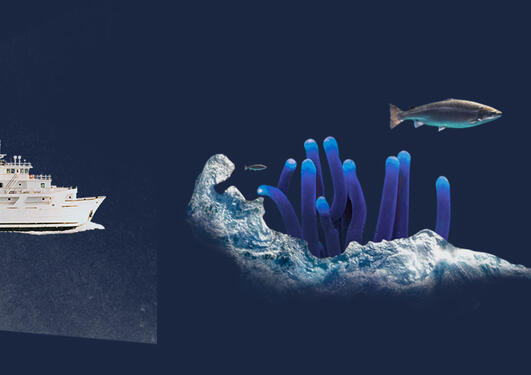Research possibilities for the SEAS postdoctoral research fellow in deep-sea mineral resources
The information on this page is a supplement to the complete advertisement of the position in the recruitment-portal Jobbnorge. The full advertisement of this position in Jobbnorge will be available after august 1, and linked from this webpage. Call deadline is October 31, 2021.
Main content
Position | SEAS postdoctoral research fellow at Department of Earth Science |
Research area | Deep-sea mineral resources |
Supervisor-team | Professor Rolf Birger Pedersen and Associate Professor Andreas Beinlich |
Mobility | For an incoming candidate |
Unit of employment | Department of Earth Sciences at University of Bergen |
Group affiliation(s) | The Centre for Deep Sea Research/Geochemistry and Geobiology Research Group |
Thematic area and supervisors
This position is connected to the Arctic spreading ridges, with a main focus on spreading processes, hydrothermal activity and the formation of mineral resources. The position is open to an incoming candidate, see mobility rules. The successful candidate will be employed at the Department of Earth Science and included in the Centre for Deep Sea Research. Information about the supervisors, research groups and research possibilities for the fellow is available below. For further details about the research possibilities please contact Professor Rolf Birger Pedersen.
Research possibilities and resources
Supervisors: Rolf B. Pedersen has been Professor in Geology at the Dept. of Earth Science, University of Bergen (UiB) since 1994. He has been leading a Centre of Excellence in geobiology, and he is currently the leader of a Centre for Deep Sea Research that is focusing on spreading ridges and hydrothermal systems. He has been working on a range of aspect related to the formation of oceanic lithosphere. This has been based on the study on ophiolite complexes, and on deep-sea expeditions using submersibles, underwater robotics and ocean drilling vessels. The research has been focused on the magmatic and volcanic processes that form the seafloor, the study of deep-sea hydrothermal systems and seafloor mineral deposits - and on interactions between the geosphere and the biosphere. To support the ongoing deep sea research initiative, he has established a national ROV-facility as well as geochemistry laboratories. He is also leading the Norwegian Ocean Laboratory that is housing a range of national ocean observation systems. Pedersen has been principal investigator (PI) on 30 national and international ocean-going research cruises, he has supervised or co-supervised 50 MSc and 18 PhD students, and has published more than 130 international publications.
Andreas Beinlich is Associate Professor in Petrology at the Department of Earth Science, University of Bergen, since 2020. His research is focused on field-based and experimental investigation of the mechanisms and timescales of fluid-rock/mineral interactions under hydrothermal to Earth surface conditions. Andreas has been working on CO2 sequestration in ultramafic rocks, large-scale hydrothermal rock alteration during ore deposit formation, and Cu mobilization by in-situ recovery (ISR). He is currently supervising 4 MSc and 2 PhD students and is the Mantle-to-Fluid work package leader in the Centre for Deep Sea Research.
Research groups/Centers: The supervisors have an established cooperation with the research groups and centers at the University of Bergen that are listed below.
- The candidate will be a member of the Centre for Deep Sea Research (https://www.uib.no/en/deepsea). The Centre is integrating marine geosciences and biosciences in a joint effort to address a range of basic science questions related to deep-sea processes, resources and environment. The Centre is responsible for major national ocean observation systems. The Centre provides professional support and advice to industry, authorities and the society on deep-sea resources and environments.
- The candidate will be affiliated to the Geochemistry and Geobiology Research Group at the Department of Earth Science (https://www.uib.no/fg/geobio)
The choice of co-supervisor from another department (or national research/company partners) than the postdocs host department will be selected dependent on the submitted project profile.
National co-operation partners: The Centre for Deep Sea Research is collaboration with a range of national research institutions through the GoNorth program (University of Oslo, University of Tromsø, NTNU, NGU, SINTEF) (see https://www.sintef.no/projectweb/gonorth/). As part of this program, the Centre will lead an international expedition to the Gakkel Ridge in 2023, that aims at studying spreading processes and hydrothermal activity at the most slow-spreading part of the global ridge system. The Centre is collaborating with the Norwegian Petroleum Directorate on topics relevant for marine mineral resources.
International co-operation partners: Depending on the focus of the submitted postdoctoral project, the international research and/or university partners hosting the candidate could be at the Ifremer, University of Kiel/GEOMAR, University of Bremen (MARUM), University of Southampton.
See the full advertisement in Jobbnorge
The full advertisement in Jobbnorge will be available after august 1, 2021. Call deadline is October 31, 2021.
